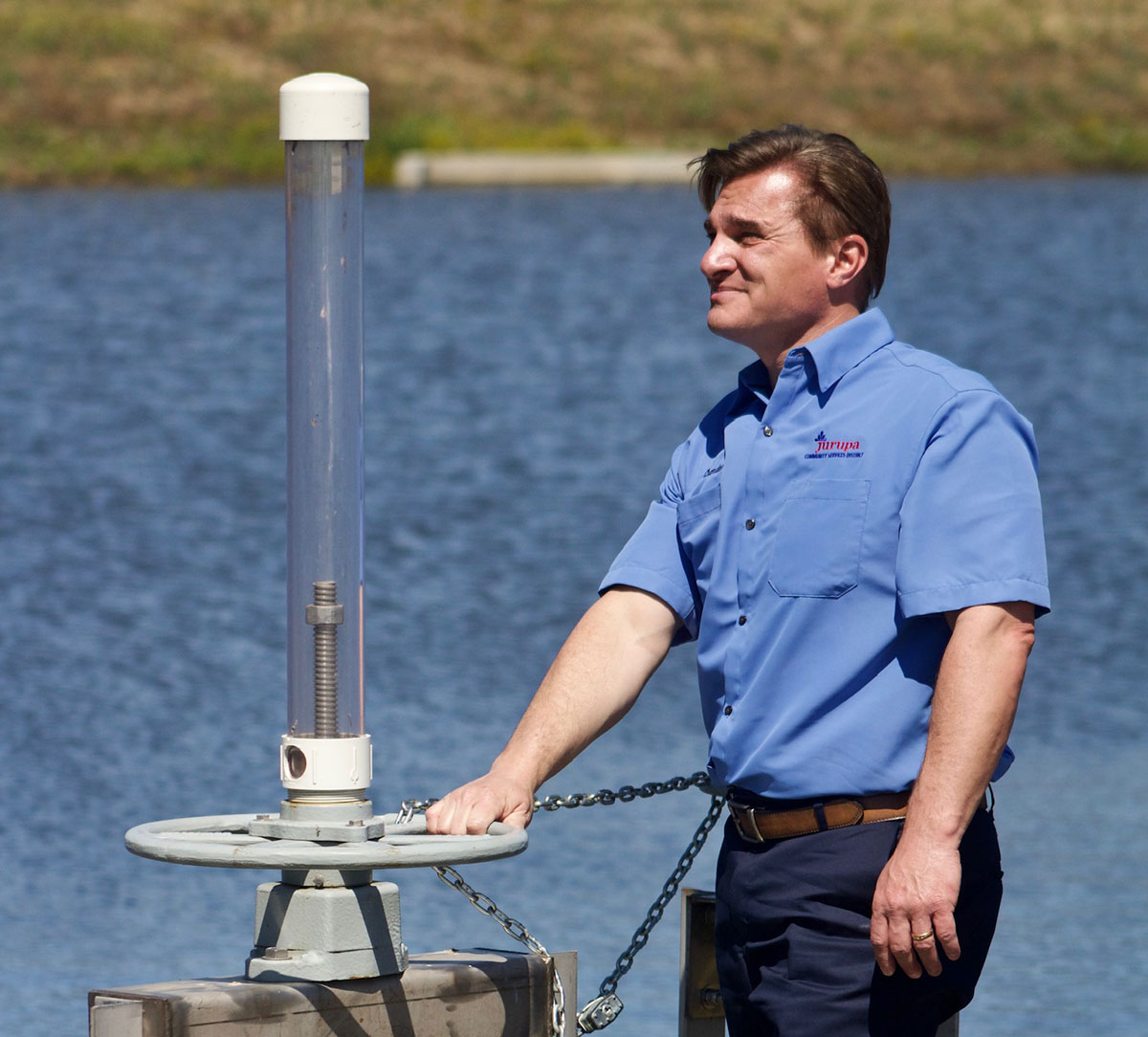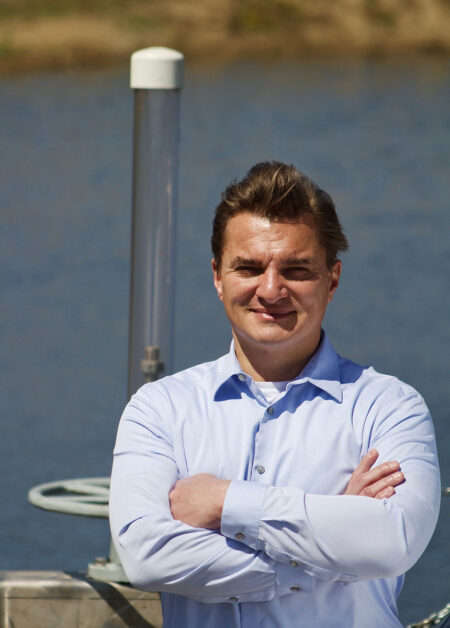
Chander Letulle is the Director of Operations for Jurupa Community Services District. He has earned multiple degrees and certifications and wants to inspire operators to pursue college degrees as well. (Paul-Michael Letulle)
High school dropout Chander Letulle never thought of himself as a scholar.
Yet Chander would go on to turn his water and wastewater operator certifications into an associate’s degree, then a bachelor’s. Eventually going back to school to earn a master’s degree in environmental engineering. The hard work paid off with a rapid series of new opportunities and promotions. Learning more to earn more and providing for his family.
Today, Chander is a highly respected utility executive who wants to give back to the next generation of operators. He serves as the Director of Operations for Jurupa Community Services District (JCSD), and as an elected board member for San Gorgonio Pass Water Agency.
His journey was unusual and challenging, but he tackled each step with resilience and skill. He hopes that sharing his academic and career stories with water professionals facing similar challenges, it will inspire them to take action and go for that degree they’ve been thinking about.
”Maybe my experience can help people get there with less struggle,” Letulle said.
Growing up in Lafayette, Louisiana, Letulle didn’t connect with high school and left to join the Army. With high marks on his high school equivalency and GED exam, he stayed in the Army for two years then transferred to the California National Guard in Santa Barbara to work on offshore oil rigs.
The pay was good but the life of an offshore worker did not match his other dream of getting married and raising a family. He didn’t like the idea of being gone 14 or 28 days at a time, so he looked for a new job that kept him closer to home.
He landed a temporary administrative support job at the Goleta Sanitary District (GSD) in 1999 but soon realized his lack of an associate or bachelor’s degree would keep him from advancing.
“College was a big scary place,” Letulle recalled. “I didn’t feel like I was ready academically. But a co-worker convinced me to take a community college course with him. Sitting in that first class, I realized I could succeed.”
With new confidence, Letulle looked at the requirements for certification programs and degree programs. The degree programs seemed too lengthy. Letulle also had a hard time understanding why he needed to take general education courses that didn’t seem relevant.
“How does art appreciation or literature review make a difference in what we’re doing?” he wondered.
Santiago Canyon College’s Water Utility Science Certificate made the most sense to him because they helped him in his subsequent roles as a wastewater treatment operator at GSD and the City of Redlands. He went on to earn three certificates of achievement and eventually gained a new role at the Inland Empire Utilities Agency as operations supervisor and later deputy manager of operations.
He still thought about the associate degree, especially as he realized more education would be needed for his next promotion. One day, Kirkwood Community College popped up in his research. They offered an associate degree of applied science which required less general education and more emphasis on water and wastewater treatment. He signed up and earned his Associate of Applied Science in Water Environmental Technology in 2011.
Never one to rest, Letulle continued climbing the career ladder and scaling new educational heights. He earned a bachelor’s degree in environmental science from American Public University (APU) and was promoted to manager of operations and maintenance at IEUA. His Master’s of Science in Environmental Engineering Systems (Water) from the University of California, Riverside came next, as did a new role as director of engineering and operations at Jurupa Community Services District.
For many people, money can be a big barrier to higher education.
Letulle encourages people to see education as an investment in themselves and their future careers. He also suggests leveraging programs your employer may offer as part of your benefits package. This can include training budgets to help earn and maintain certifications and tuition reimbursement programs. Finding affordable higher education options like community colleges and APU can also stretch your education dollars.
Letulle was particularly impressed with APU because the private, for-profit online university helps busy professionals get coursework done by offering classes on a rolling basis in an eight-week format. Classes start every Monday and happen all year round, not just in fall and spring like many community colleges.
This means degrees can be earned in less time. One of APU’s unique and valuable benefits to quickly obtaining a degree is the school allows students to receive transfer credits for previous military service, professionals certifications, on-the-job training, and real-world experience.
APU recognizes the State Water Board, CWEA, and CA-NV AWWA as certifications that can qualify as transfer credits.
“My road was a long one,” Letulle said. “I thought to myself, if I could build a program to address all that pain, what would it look like?”

Screenshot from the American Public University webpage. (APU) Chander helped the university build a program that recognizes water and wastewater certifications with college credits.
He volunteered to help APU make the program a reality. The result is APU’s new Associate Degree in Technical Management with a Concentration in Utilities Management that launched in January 2023.
“Most important to me was making sure people were taking classes that mattered and they received college credit for their water and wastewater certifications,” Letulle said.
APU is the first university to offer college credit for professionals who hold water and wastewater certifications.
He also liked that APU was able to build a program with a reliable, consistent timeline allowing busy professionals to plan ahead.

Photo of Chander by Paul-Michael Letulle.
Letulle’s story is inspiring, illustrating the importance of education within the water sector in order to be prepared for your next great promotional opportunity.
So far, he has been able to convince colleagues to follow in his footsteps an pursue their own educational goals. One colleague is finishing up his bachelor’s degree this summer. Two are earning associate degrees and a handful more are thinking about applying.
In the future, Letulle hopes to see APU attract enough water industry pros so an entire water industry cohort could begin with everyone starting and finishing the program at the same time.
He also hopes to find other like-minded individuals willing to help people get started on a path towards promotions. Above all, he wants to tell people that no matter which program they choose, college degrees are within grasp if they’re willing to make the time.
“Degrees help convey credibility, which is important to public agencies in demonstrating how they’re spending public money,” Letulle said. “I’ve seen people get passed up for opportunities because they hadn’t prepared for the next level of their career.”
He hopes to change that by making it easier for folks to follow in his footsteps and achieve their own dreams and goals.